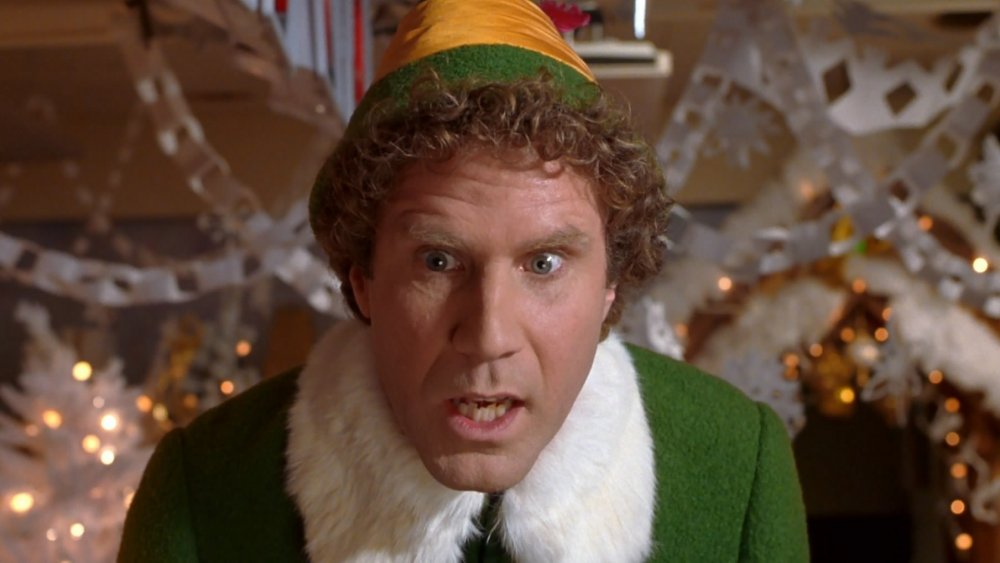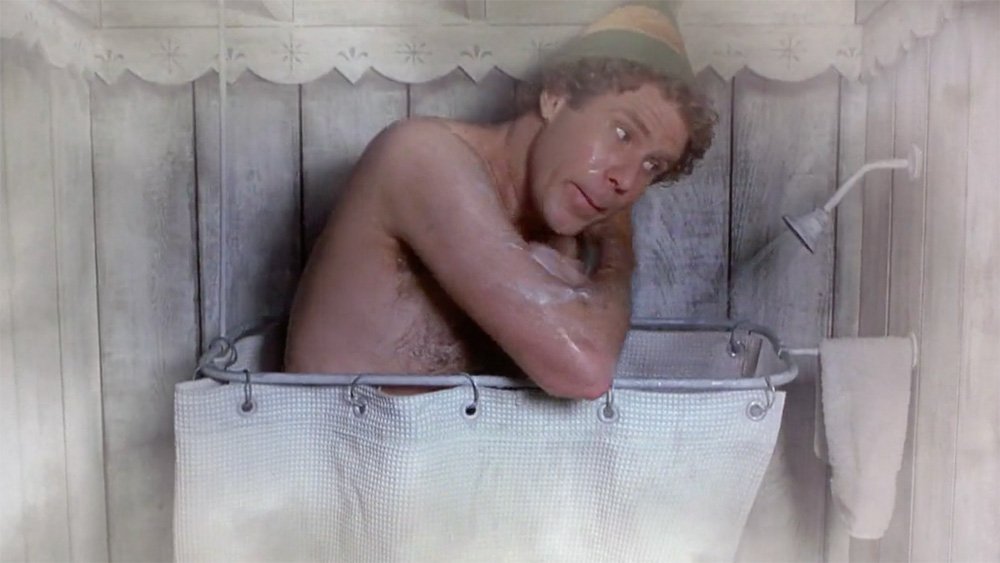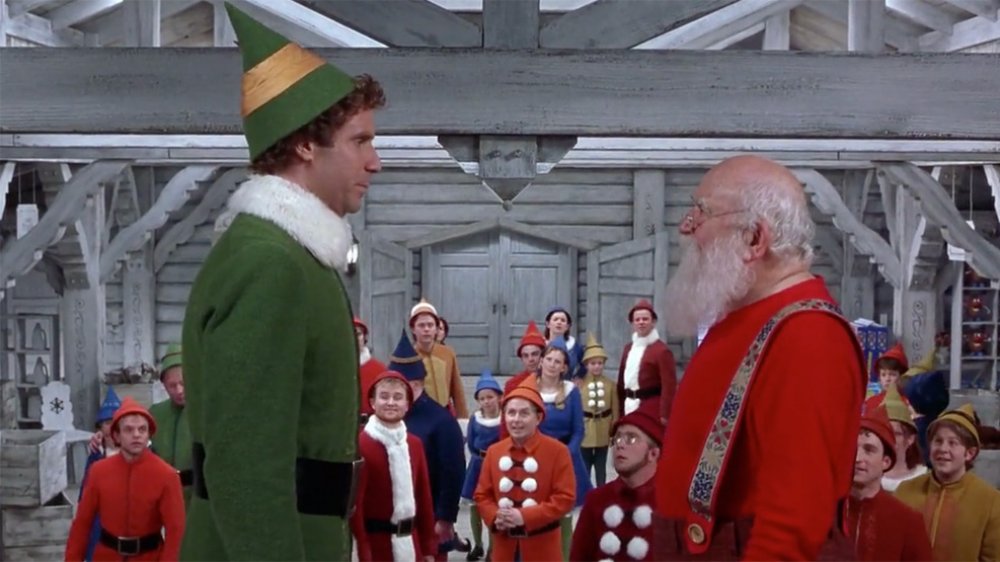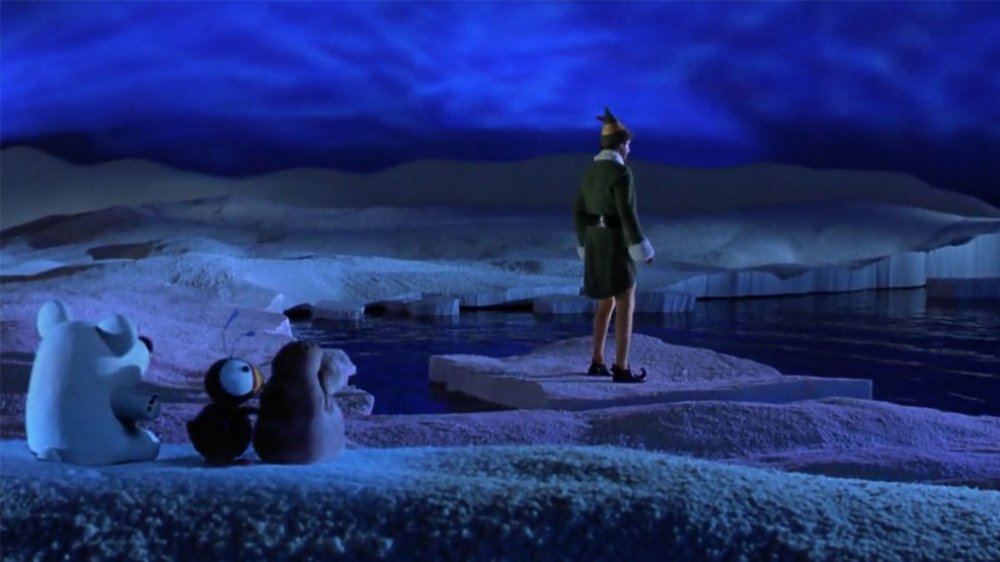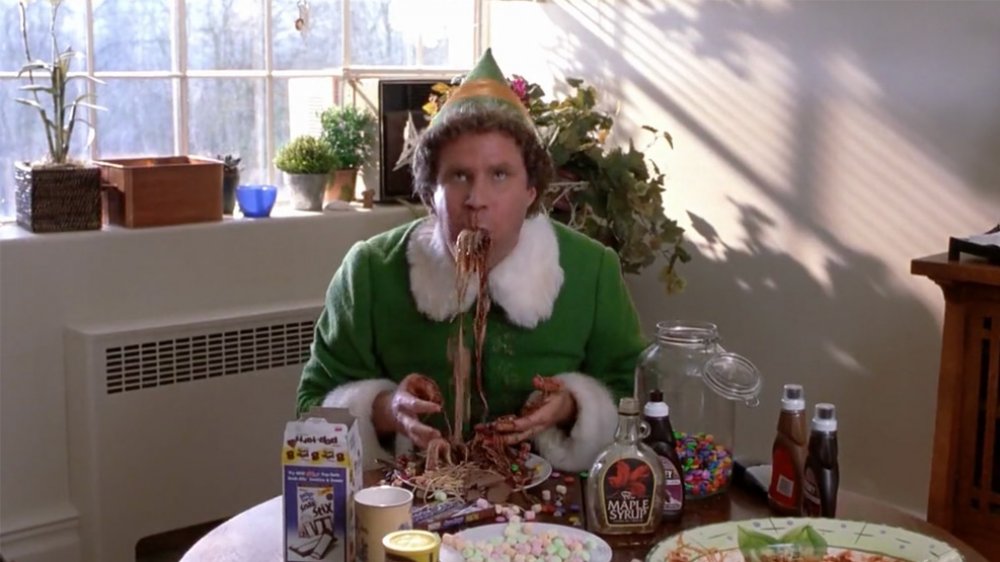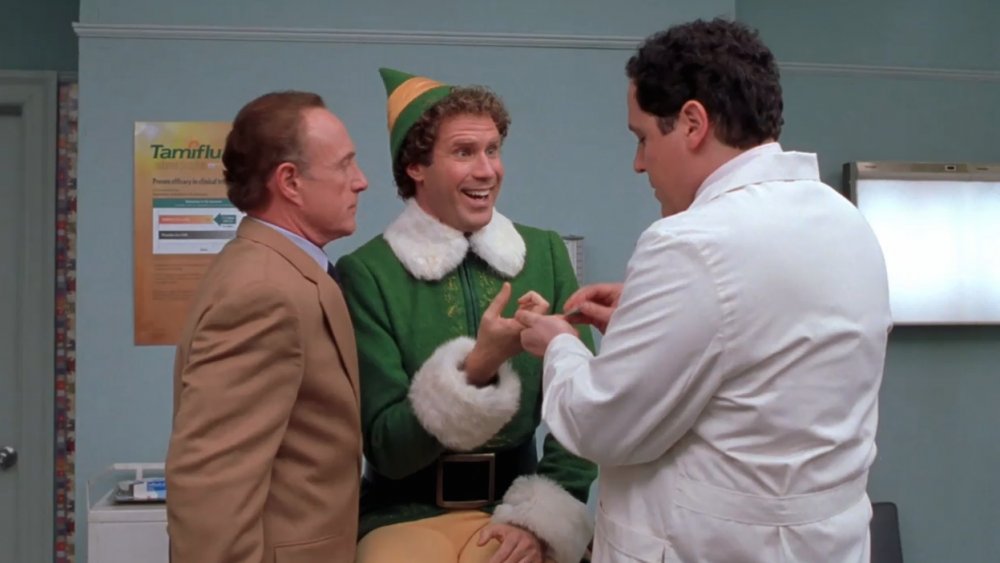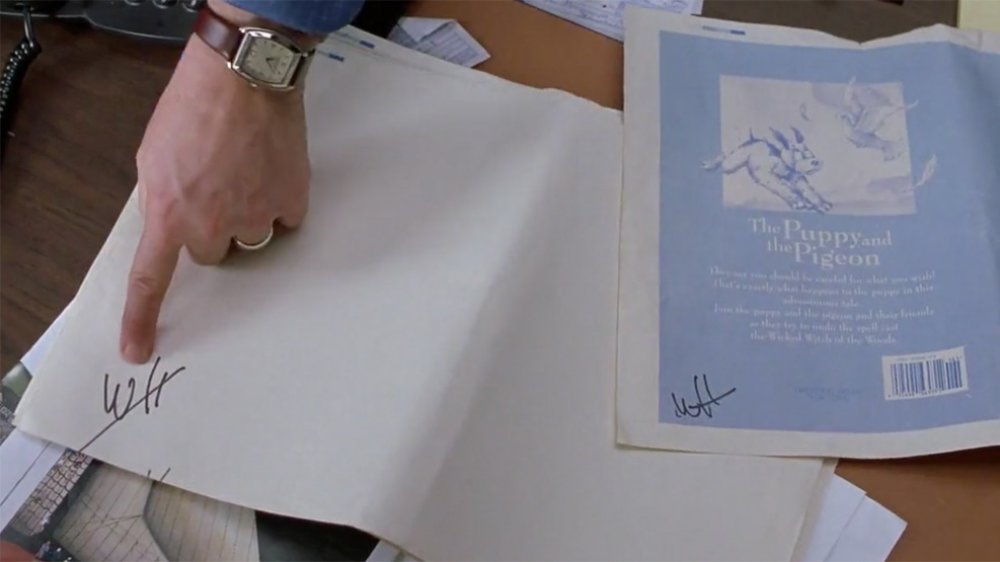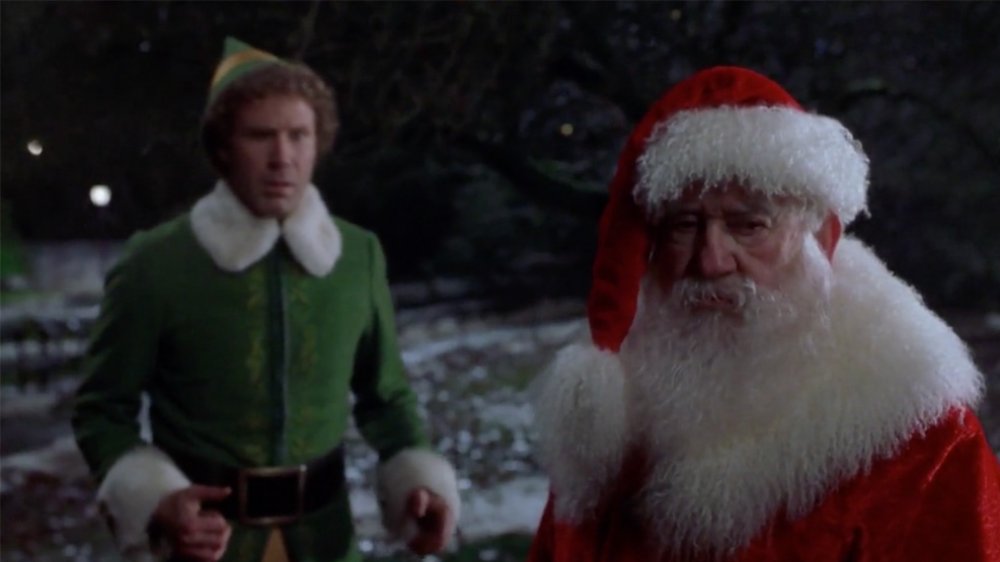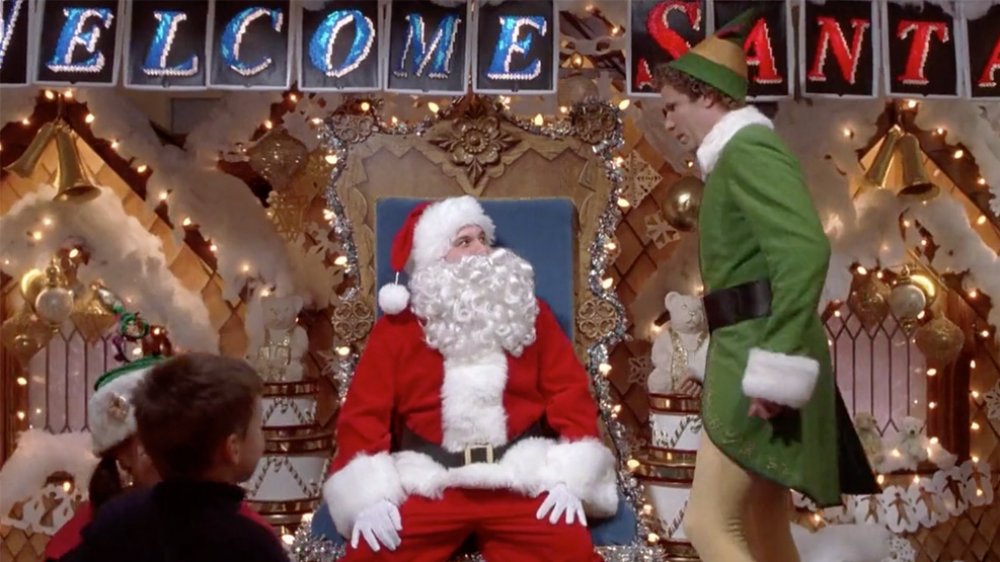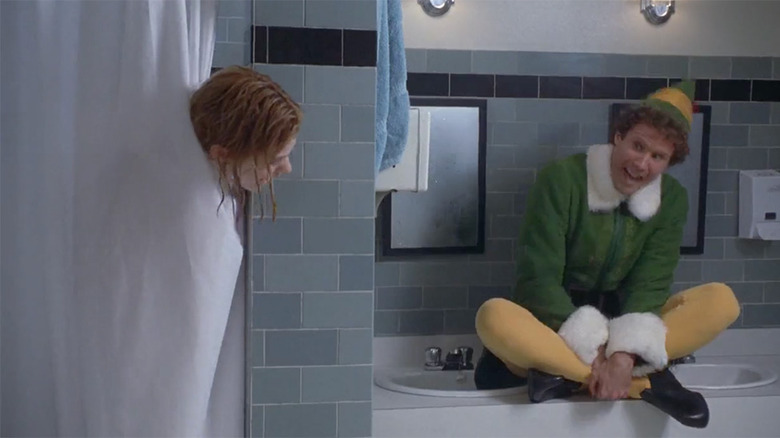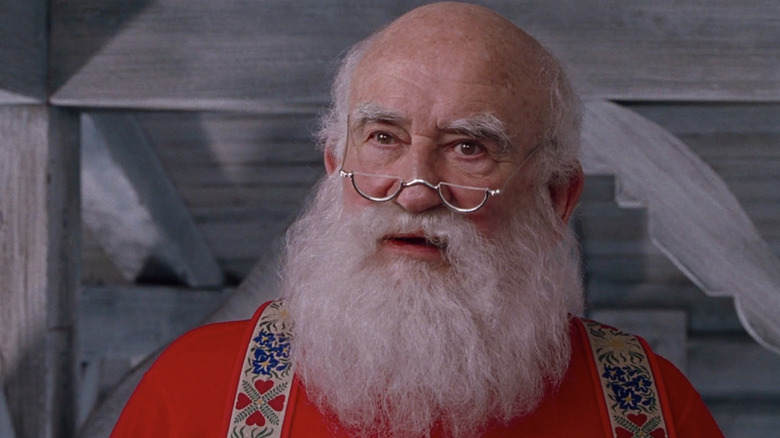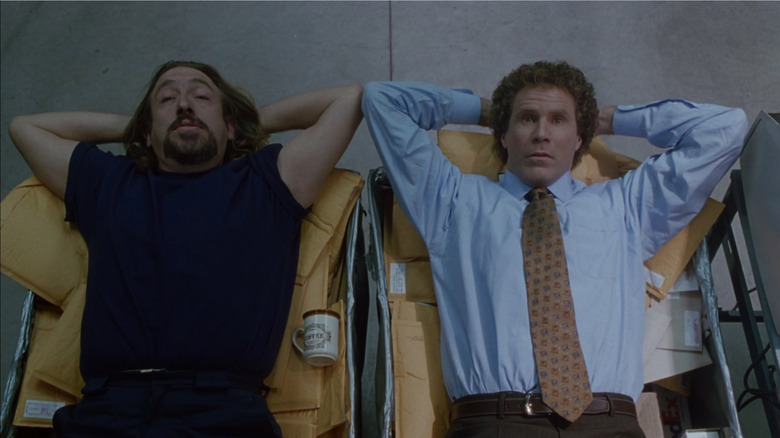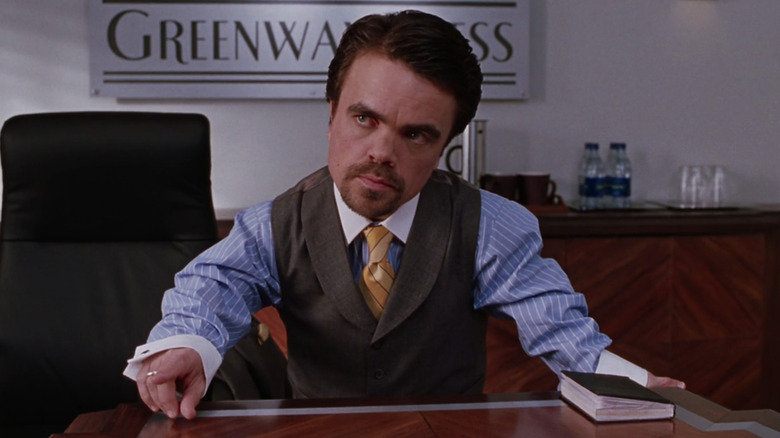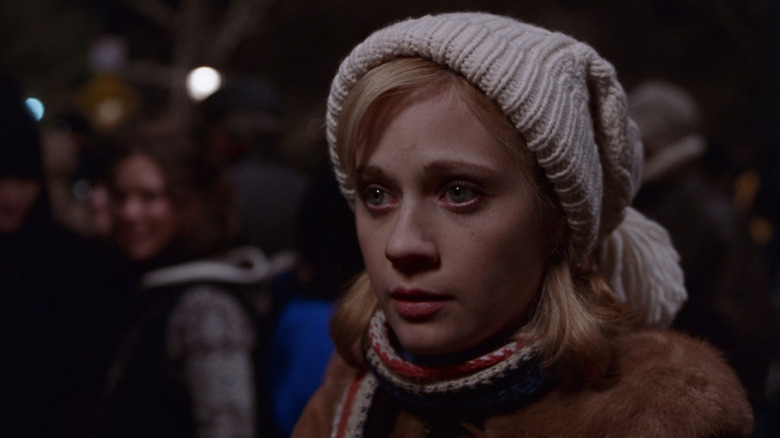Dumb Things We All Ignored In Elf
Over the past two decades, "Elf" has become one of the most beloved Christmas movies of all time. The cheerful story of an oversized elf in his mid-30s at Santa's workshop who realizes that he might not be an elf after all and goes in search of his human father is a favorite for the entire family, thanks to its slapstick comedy, clever writing, and genuine heart.
In other words, it's a good movie. In fact, it's a great movie that has more than earned its place in the pantheon of classic Christmas flicks, but that doesn't mean that it's perfect. We might even love it so much that we're willing to forgive all of the plot points that just don't make sense, even for a movie full of holiday magic. Maybe pointing out all of these mistakes makes you feel like a cotton-headed ninny-muggins, but here are the dumb things that we all just ignore about "Elf."
Just make him a bed
At its heart, "Elf" is a classic fish-out-of-water comedy, but with the added twist being that the fish — played in this increasingly tortured metaphor by Buddy the Elf — doesn't fit in back in the water, either. The movie's opening scenes show us some great physical comedy as the 6'3" Will Ferrell squeezes himself into elf-sized beds and showers.
But here's the thing. Why don't the elves just, you know, make him a bed? One of the things that makes the movie feel heartwarming and Christmasy is that the other elves up at Santa's workshop are generally pretty nice to Buddy. They even take time to reassure him that he's got his own special talents when he starts to feel like he doesn't fit in, and even if they get frustrated behind his back, it's clear that they care about him. So why, in the 30 years that he's been there, haven't they made the slightest adjustment to their housing situation so that he's not destroying his spine every night?
It's not like it would take them that long. Building things is literally all the elves do, and a king-sized bed frame and mattress surely wouldn't take as much time to cobble together as, say, building a PlayStation 4 from scratch. He's not even the only one there who needs human-sized furniture, since Santa Claus also lives there and has been doing so for about 1500 years! Even if the elves aren't the ones who made his furniture, just order another mattress and put it on the floor. It's not great, but it's better than nothing.
A few small clues for Buddy
The odd thing about Buddy the Elf is that he never seems to notice that he's roughly three times taller than everyone he knows. Well, almost everyone.
The only exception is Santa Claus. Buddy's still taller than Santa — St. Nicholas was born back in the third century, and people were a little shorter back then — but it's not to the extent that it is with the other elves. If anything, Buddy should probably assume that he's a Santa, or at least some other kind of human. The only reason that Buddy thinks he's an elf at all is that after accidentally kidnapping him when Buddy was an infant, Santa pulls the very un-Santa-like move of a) keeping him and b) handing him off to the elves. This, by the way, is not what you should do if you ever find a baby.
Buddy's naivete is at the core of the film, but there's a fine line between his earnest, good-natured belief that a random diner really did perfect the world's best cup of coffee and the kind of oblivious ignorance of just not being able to put simple clues together. You'd think that if you can figure out how to build 85 Etch-a-Sketches in a single day, you'd be a little bit better at putting things together.
What's up with the walking distance in Elf?
This is going to sound pretty nitpicky for a movie where we're willing to accept that Santa Claus can fly around the world in a single night giving all the good children presents, but bear with us. The fact that Buddy walks from the North Pole to Manhattan is quite frankly ridiculous.
There are a lot of reasons for that, primarily the fact that it's a straight shot of about 3,400 miles from Santa's workshop to the Manhattan. Even if we're willing to accept that the iceberg he floats off on takes him down to Canada, that still leaves him in Nunavut — specifically at Alert, the northernmost permanently inhabited settlement on the planet — with 2,900 miles left to go. We'll give you that his elf clothes are magical and able to keep him warm at the North Pole and below, but still. No matter how hyped up he is on maple syrup and candy corn, that's a long and potentially — or, let's be real here, almost certainly — fatal journey for someone who's completely unprepared for it.
Now here's why this isn't as much of a nitpick as it seems like. The scene sticks out because this is a movie with Santa in it. The guy has a magic flying sleigh that can cover 212,000,000 miles in a single night! Sure, he's a busy guy around the holidays, but are we really meant to believe that Santa Claus can't take 0.4 seconds out of his day so that he doesn't have to deal with a singing penguin finding a dead body in the Candy Cane Forest after the spring thaw?
Buddy's candy diet would've killed him
One of the biggest sources of comedy throughout "Elf" is Buddy's ridiculously candy-centric diet. After all, he hails from a land of Christmas cheer that was inspired by the Rankin-Bass stop-motion specials of the '60s, so he grew up on a steady diet of candy canes and gingerbread, to the point where he describes the North Pole's four food groups as "candy, candy canes, candy corns, and syrup." Hilarious!
Of course, that means Buddy should be straight-up dead. You probably figured this out for yourself in the days after Halloween when you were a kid, but a diet that consists entirely of candy isn't just unhealthy, it's also a great way to get Type 2 Diabetes. Sure, you could explain it away by saying that all the candy at the North Pole is suffused with Christmas magic that makes it delicious and nutritious, but after he comes to New York, Buddy keeps up his standard habits, drowning a plate of spaghetti with an entire bottle of maple syrup and washing it down by slamming an entire two-liter bottle of Coca-Cola. In fact, the few things we see him eat in the movie that aren't candy are a bottle of booze and a jar full of cotton balls. (By the way, in real life, those cotton balls were actually cotton candy.)
If you need any evidence that wolfing down that much sugar was a bad idea, look no further than Will Ferrell himself. In interviews about the film since its release, he's talked about how he lost sleep while the movie was being filmed thanks to the constant sugar intake. Multiply that by 36 years worth of sugar-coated meals, and you've got health problems that go way beyond a little insomnia and into the territory of having your heart explode while chugging maple syrup.
Elf features the worst doctor in the world
Just five years away from "Iron Man," Jon Favreau was the man who directed "Elf," and he even has a small part as the Hobbs family's friendly physician. (He also provides the voice of the North Pole's resident narwhal.) And while we're talking about Favreau's doctor, we'd be remiss if we didn't cover what might be the worst medical decision ever committed to film. After performing a DNA test to confirm that, yes, Buddy is in fact Walter's biological son, the doctor advises Walter to take Buddy home to meet his wife and son in hopes that he'll eventually come to terms with his situation and "drop the whole elf thing and move on."
Obviously, that all works out for Buddy and the Hobbs family, but by any measure, this is some truly terrible advice. Both Walter and the doctor are operating under the assumption that Buddy is extremely delusional. Any medical professional worth his stethoscope would most likely suggest that they get Buddy some immediate treatment, psychiatric or otherwise, before his disconnect with reality leads to more violence.
That's right. More violence. The scene with the blood test happens directly after Walter bails Buddy out of jail after he assaults a department store Santa at Gimbels. In other words, the doctor is confronted with a delusional man with a very recent history of violence, and his solution to this problem is "take him home to your wife and kid." Here's hoping the first thing the Hobbs family does after the credits roll is get themselves a new GP.
Walter is bad at his job
The driving conflict of "Elf" is that Walter Hobbs, Buddy's long-lost human father, has landed himself squarely on the naughty list. The reason? Well, in addition to just being a fairly unpleasant person — and all those murders he did in The Godfather — Walter has been neglecting his family and focusing too much on his work. This is the plot to plenty of Christmas movies about learning how to love your family more effectively under the bootheel of capitalism, but there's something different about Walter's story. He's genuinely terrible at his job.
Normally, the person in this kind of plot who's obsessing over their work is at least successful in that arena, which makes it more effective when they have to choose what's capital-letter "Really Important." Walter's got plenty of money — that apartment at Central Park West doesn't come cheap — but as far as the work goes, he's hardly a success. His company's floundering, and their downturn is a direct result of decisions that he made.
Or rather, due to decisions that he didn't make. Despite filling the role of the workaholic who spends too much time at the office, Walter doesn't actually seem to care about anything that he's doing at work, to the point of approving a proof of a book that was missing two pages. Even the most inept employee would notice if he was initialing two gigantic blank pages, so the simple fact is that Walter just doesn't care. That raises a pretty grim question, though. If he's neglecting his family for work, but he's not actually doing any work, is he just sitting there, taking as much time away from his wife and son as he can so that he can stare off into space and contemplate oblivion? That is dark.
Where's all the Christmas spirit in Elf?
The major drama at the climax of the film centers around whether Santa's sleigh is going to be able to fly without the engine that's been keeping it going all these years. See, without the engine, the sleigh has to rely entirely on the magic of Christmas cheer to power it around the world, and according to the Clausometer, there's just not enough Christmas spirit to do the job.
But that doesn't make sense. This is a world where Santa Claus is 100 percent, actually, factually real, with a toy factory at the North Pole staffed by cheerful singing elves, a talking snowman, and everything that goes along with him. He brings presents to the good children all over the world, which means that there's no disillusionment or disappointment from kids who didn't get what they wanted on Christmas morning. We also know from the movie that getting a present does in fact increase your Christmas spirit, as Michael, Walter's other son, boosts the Clausometer a little bit when he gets the skateboard he's always wanted. So if Santa and the elves have been doing their job — and as far as we know, they have — then there should be more than enough Christmas spirit to go around just from that, let alone all the general feel-good sentiments of peace on Earth, goodwill, hot chocolate, etc.
Maybe there's a reason for it, though. It could be that this was just a abnormally bad year for the Christmas spirit for reasons that have nothing to do with Santa. Let's see, this movie takes place in New York, and it came out in 2003 ... was there anything that happened in the early 2000s in New York that would've been catastrophically depressing?
Santa's little helpers
One of the things that makes "Elf" such a favorite around the holidays is that it's an almost relentlessly cheerful film without getting too sugary sweet — Buddy's spaghetti notwithstanding. In fact, the closest it gets to anything you'd call "dark" would be the depiction of the Santa-hating Central Park Rangers at the end. Oh, and that one part where Buddy commits felony assault on an innocent man for the crime of dressing up as Santa Claus.
Even if Buddy's sudden temper is slightly out of character, that all makes perfect sense in the context of the movie. What happens after, however, seems like a stretch. Since the original Gimbels Santa is no longer available, the toy department's manager has to fill in, and frankly, that's ridiculous.
If you've ever been to Macy's around Christmastime — or read David Sedaris' "Santaland Diaries," which chronicled his time working as an elf at the department store and was cited by Favreau as an inspiration for the scenes — then you already know that these stores take their Santa setup very seriously. It's a lot more complicated than just one dude sitting on a big chair, asking kids what they want for Christmas. The Gimbels we see in the movie might not be as dedicated to it as Macy's, of course. Historically, the real-life Gimbels was Macy's competitor until shutting down in 1987, with their rivalry cementing itself into Christmas movie history as a plot point in the original "Miracle on 34th Street." Still, the idea that a store that big wouldn't have at least a couple of backup Santas is somehow more difficult to believe than the flying reindeer.
Baby, it's cold outside
Buddy's romance with Jovie, a young woman working as an elf at Gimbels (played in a star-making turn by Zooey Deschanel) ends up being pretty sweet, but it has a rocky start. Most people don't wind up going on dates with strangers who sneak up on them in the shower, no matter how nice they are about your singing afterwards.
Considering that "Elf" has a runtime of just over 90 minutes, it makes sense that things have to move pretty fast to get everything wrapped up by the time the credits roll. Still, Jovie's awfully quick to forgive Buddy for creeping up on her in the shower, especially since the next two interactions she has with him involve him beating up the guy playing Santa Claus and then telling her that his tongue swells up around her and asking if she wants to "go eat food." The fact that she goes out with him at all, let alone ends up in happy elfin matrimony after it's all said and done, is, well ... it's a Christmas miracle.
The weirdest part of all this might be one that Jovie would have no way of knowing, but that we in the audience can peg as what might be the only lie Buddy tells in the whole movie. When she asks if he was spying on her in the shower, he replies, "I didn't know you were naked," which seems plausible, given Buddy's naive nature. The thing is, he definitely knew she was in the shower, and we actually see Buddy showering (in an elf-sized tub) earlier in the movie. Of course, he did have his hat on at the time, but we're not really sure that counts.
Santa's shaky judgment
There are any number of ways to tell a child that they are adopted, though perhaps no worse way than for them to overhear it from two co-workers badmouthing their Etch-a-Sketch production output. Buddy learns the hard way that he is not an elf, and while you might reasonably expect him to come to that conclusion after a decade or two, it's also not unreasonable to expect Papa Elf and Santa to have had that conversation directly, saving Buddy a bundle of unnecessary trauma.
Santa's judgment in regards to the whole Buddy situation becomes even more suspect considering the fact that he's apparently had all the information needed to reunite Buddy with his father for years. It would be one thing if Buddy were simply an anonymous orphan who crawled into Santa's sack one year; in that case, it would make a certain amount of sense for Santa to take the human baby in and raise it at the North Pole. But Santa also knows the name of Buddy's mother (Susan Wells), the circumstances of her death, the name of his still-living father (Walter Moss), Walter's job and the location of his office, and the fact that Walter is on the Naughty List. He only reveals this information when his hand is forced, as Buddy inadvertently discovers the truth. While it's hard to hate on Santa Claus, all of this points to a serious lapse of judgment on the Big Guy's part.
Wait, that guy's 26?
Every year, it seems that someone on the internet discovers and is newly horrified by the scene in which Buddy, banished to the Greenway Press mailroom for irritating Walter, makes friends with — and accidentally gets day drunk with — a worker played by character actor Mark Acheson. As they recline on a pair of rolling carts full of padded envelopes, declaring themselves best friends, Mailroom Guy (as he is credited) laments the direction that his life has taken; he just goes with the flow, but now he needs to get out of the flow. "I'm 26 years old, I got nothing to show for it," he says.
Aside from the fact that the same joke was made in "Fletch," it gets the point across: Mailroom Guy has been living a tough life.
Acheson was in fact 46 years old when the film was released, and while he may appear relatively youthful for a 46-year-old, he makes for an alarmingly craggy, gravel-voiced 26-year-old. Mailroom Guy works in a chaotic processing room with no source of natural light, he drinks from a half-pint of hard liquor on the job (which Buddy rudely polishes off, thinking it's syrup), and only has the job thanks to a prison work-release program, which means he's likely done hard time. So, the impact of the gag makes for a worthy suspension of disbelief.
Miles Finch
The scene featuring future "Game of Thrones" star Peter Dinklage as hotshot children's book author Miles Finch is cringe-inducing, but purposely so. Walter has bribed Miles to come into the office and help his clueless in-house writers (Andy Richter and Kyle Gass) with a new book pitch. He's hoping this pitch will be the thing that gets Walter back in good with his boss (Michael Lerner) and save his job.
But before Miles can get into his potential storyline, Buddy barges into the meeting and mistakes the man for an elf. Miles takes umbrage at Buddy's sincere excitement to see a fellow elf as a crack about his height, and while he tries to keep his cool, eventually Buddy's "insults" become too much to bear; Miles runs across the boardroom table and drop-kicks him.
That all makes sense, even if — in illustrating Buddy's insensitivity — the film itself gets a little insensitive. What doesn't make much sense is how no one else in the scene — not Walter, his writers, or his secretary (Amy Sedaris) — does anything to break up the fight, as Miles chokes Buddy to the ground and breaks every lighting fixture and piece of glassware in the room along the way. They all just sit there, apparently frozen in shock, until the scene ends with Walter angrily disowning Buddy. While the amount of unnecessary property damage is not the primary concern of the scene, parents who have watched it 1,000 times might find themselves tallying up the likely cost of putting that boardroom back together.
Santa Claus is coming to town
As Buddy and Santa work to get the sleigh up and running to evade the Central Park rangers, Jovie does what she can to boost the city's Christmas spirit by standing in front of a crowd and singing a carol in her charming, low-key, extremely Zooey Deschanel vocal style. With a little help from Mary Steenburgen's Emily, the song spreads across the crowd, and soon across the city, pushing the sleigh into the sky and saving Christmas for everyone.
The scene is a good payoff to Jovie's stated aversion to singing in front of people and a fine way to integrate her and Emily into the film's climax rather than leaving them on the sidelines while the men go about saving Christmas. Her song choice, "Santa Claus is Coming to Town," is on one hand very thematically appropriate; Santa Claus has indeed come to town.
On the other hand, it is a very brief song, with only a handful of lyrics being repeated ad nauseum. When you consider how many times in a row Jovie, Emily and the entire island of Manhattan sing the same ten lines or so as the third act unfolds, their moment of solidarity becomes less a festive expression of holiday spirit and more an infeasible peculiarity, possibly akin to the communal manic episodes that once afflicted medieval cities. Next time, perhaps a nice medley would be more appropriate?
